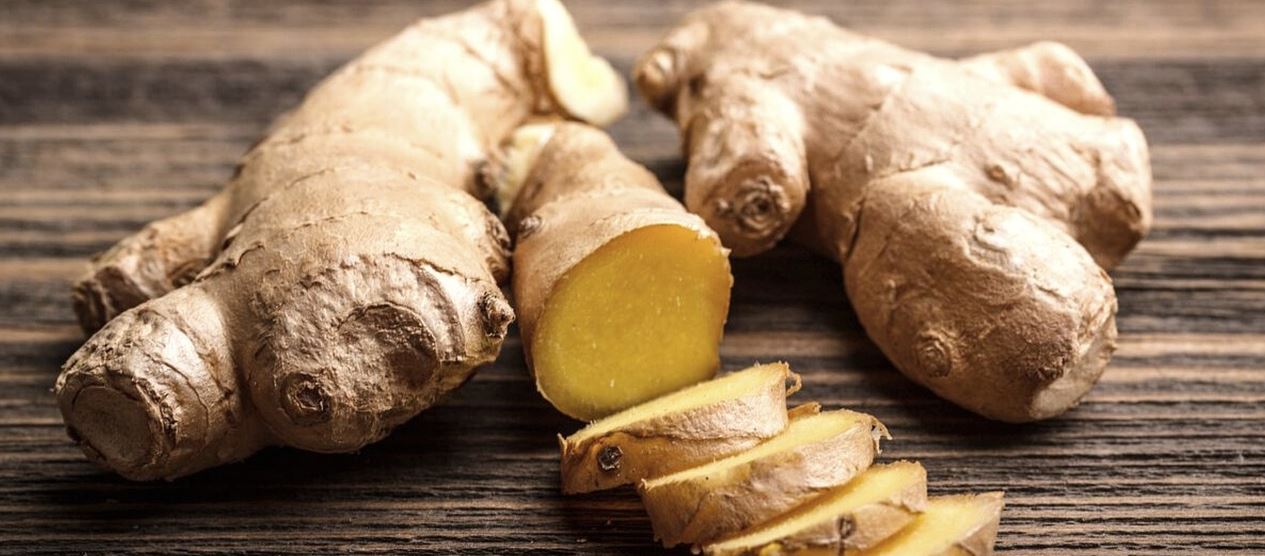Fascinating Health Benefits of Ginger

Ginger, a renowned superfood, has been treasured for centuries for its potent medicinal properties and distinct, zesty flavor. Used in various healing traditions, such as Ayurveda and Traditional Chinese Medicine, ginger has stood the test of time as a powerful remedy for numerous ailments.
This comprehensive guide explores 25 fascinating health benefits of ginger, including its impact on digestion, inflammation, immunity, and more.
A Brief History of Ginger
Ginger, scientifically known as Zingiber officinale, is a flowering plant belonging to the Zingiberaceae family. Since more than 4,000 years ago, ginger has been effective as a culinary and medicinal agent.
With its unique spicy aroma and slightly sweet flavor, ginger has become a staple ingredient in many traditional dishes worldwide.
Ginger is essential for healing, especially in Ayurveda and Traditional Chinese Medicine.
Today, modern science continues to uncover the numerous health benefits of ginger, further solidifying its status as a versatile and potent superfood.
Nutritional Profile of Ginger
Ginger boasts a rich nutritional profile, containing an array of essential nutrients, including proteins, carbohydrates, dietary fiber, vitamins, and minerals. Some critical components of ginger include:
Gingerol: A powerful antioxidant and anti-inflammatory compound responsible for ginger's unique flavor and aroma.
Shogaol: A phenolic compound with anti-inflammatory and antioxidant properties.
Vitamins and Minerals: Vitamin B6, magnesium, potassium, copper, and manganese are some of ginger's essential vitamins and minerals.
Ginger has a lot of good vitamins that work well together to help your body be healthy.
Top 25 Fascinating Health Benefits of Ginger
The advantages of consuming ginger are manifold and highly beneficial to one's health. By listing 25 positive changes from consuming ginger, this article emphasizes the benefits of incorporating ginger into one's diet.
1. It helps with Digestive Issues
One of ginger's most well-known health benefits is its ability to alleviate digestive issues. Ginger's active compounds, such as gingerol and school, can help stimulate digestive enzymes.
It can also improve gut motility and ease gastrointestinal discomfort. By incorporating ginger into your diet, you can experience relief from indigestion, bloating, and other digestive problems.
Ginger is a powerful natural remedy for stomach ulcers. It has been studied extensively and found to reduce inflammation and pain and stimulate mucus production in the stomach – all of which can help heal an ulcer.
Studies have also shown that ginger can inhibit the growth of Helicobacter pylori, a bacteria responsible for many cases of stomach ulcers. Furthermore, ginger helps reduce acid reflux and improve digestion, essential for healing an ulcer.
2. Reduces Inflammation
Thanks to its potent anti-inflammatory compounds, Ginger can effectively reduce inflammation and associated pain. Gingerol and shogaol can inhibit the production of inflammatory enzymes, relieving conditions such as arthritis, muscle pain, and joint discomfort.
3. Boosts Immunity
Ginger's antioxidant and antimicrobial properties make it an excellent ally in supporting a robust immune system. Regular consumption of ginger can help protect against infections, reduce the risk of chronic illnesses, and promote overall health and well-being.
Maintaining a robust immune system is crucial to maintaining good health and well-being. Pollution, stress, and insufficient sleep can make it harder for your body to work well.
4. Aids in Weight Loss
Ginger's thermogenic effect can help increase the body's metabolism, making it an effective aid in weight loss. Moreover, ginger's ability to regulate blood sugar levels and promote satiety can help control appetite and prevent overeating, further supporting weight management goals.
5. Eases Nausea and Morning Sickness
The anti-nausea properties of ginger are common in both traditional and modern medicine. Ginger can help alleviate nausea and vomiting associated with motion sickness, chemotherapy, and pregnancy. By incorporating ginger into your daily routine, you can find relief from these uncomfortable symptoms.
6. Improves Cardiovascular Health
Ginger can help support cardiovascular health by reducing cholesterol levels, lowering blood pressure, and preventing blood clot formation. The antioxidants in ginger can also help protect against oxidative stress and promote overall heart health.
7. Enhances Brain Function
Ginger's anti-inflammatory and antioxidant properties can help protect the brain from age-related cognitive decline and neurodegenerative diseases. Regular consumption of ginger may improve memory, reaction time, and overall brain function.
8. Supports Healthy Skin and Hair
Ginger's antioxidant and anti-inflammatory effects can also benefit your skin and hair. Applying ginger can help reduce acne, blemishes, and inflammation, while its nutrients can promote hair growth and prevent hair loss.
9. Relieves Menstrual Cramps
Ginger's pain relief properties extend to the alleviation of menstrual pain. Consuming ginger during the onset of menstruation can help reduce the severity of cramps and relieve many women.
10. Provides Anticancer Benefits
Studies show that ginger might be able to fight cancer because of its natural substances called gingerol and shogaol. These substances can stop cancer cells from growing and make them die, and they work on different kinds of cancer, such as ovarian, breast, and colon cancer.
11. Antioxidant Properties
Incorporating ginger into your diet may deliver health benefits and improve your feelings. This root is full of good stuff that helps protect cells and may prevent long-term illnesses.
Ginger can help decrease swelling and reduce pain because of its anti-inflammatory characteristics. In addition, it tastes good, is simple to use in dishes, and can be drunk as tea or taken as a health product.
12. Anti-bacterial Properties
Anti-bacterial properties are becoming increasingly popular due to its ability to help fight off harmful bacteria in the body. Research studies have shown ginger has powerful anti-bacterial properties that can help prevent and even treat various illnesses caused by bacteria. Ginger makes it an essential tool in the fight against bacterial infections and diseases.
13. Cognitive Function
Ginger has long been known for its medicinal properties, and studies suggest that it may even improve cognitive function. Research has shown ginger can increase alertness, elevate mood, and help memory recall. It also has anti-inflammatory effects that could benefit those suffering from brain fog or mental fatigue. This spice is an easy and delicious way to boost your brain power!
14. Dental Health
Ginger is good for your health and can help improve your teeth, but people usually don't think about that. The newly conducted research has revealed that ginger can naturally fight inflammation and bacteria, thus contributing to better dental health and a reduced likelihood of developing gum disease. From reducing plaque buildup to battling lousy breath, ginger is a powerful ally against poor oral hygiene.
15. Liver Health
Ginger's robust and innate characteristics make it a powerful remedy that can revitalize your liver functions and uplift your mood and health. For a long time, ginger lower swelling and creates enzymes that can clean the body. Research indicates that ginger may offer protection against certain types of cancer, enhance digestion, lower cholesterol, and assist with weight management.
16. Anti-aging Properties
Getting old will happen to everyone, but using Ginger can help you lessen its impact. Studies have proved that this spice is full of antioxidants and can help make you look younger by reducing signs of age like wrinkles, age spots, and dark circles. This natural remedy can help your skin become stretchier and stop you from looking old for a long time.
17. Anti-depressant Properties
Ginger is much more than just a tasty addition to food and drinks. Research has revealed that ginger can also positively impact mental health due to its anti-depressant properties that may help improve mood and reduce symptoms of depression. Ginger could be the natural remedy we've been seeking through its natural compounds for those suffering from depression or low moods.
18. Headache Relief
Ginger is a vital natural remedy for headaches and migraines. Recent studies have shown that this powerful herb can reduce inflammation, promote circulation, and improve overall brain function.
Its components can alleviate the pain and unease of headaches and migraines by reducing inflammation. Ginger is good for you and can make you feel better when hurt.
19. Anti-viral Properties
Recent research has also revealed that ginger has potent anti-viral properties, which can help boost the immune system and fight off viruses.
Ginger is an all-natural remedy someone can consume in various forms, including tea, capsules, and fresh root. Its powerful anti-viral abilities can be a great asset in helping your body fight off infections and illnesses caused by viruses.
20. Joint Health
For many years, ginger has been used as a natural way to make joint pain and stiffness feel better. New studies have found that ginger can lessen swelling, make your joints move more efficiently, and make it less painful for people with arthritis.
Also, ginger is a potent substance that can protect joints from worsening. It can also help decrease swelling and pain because it fights against things that harm the body. Ginger can help relieve joint pain and stiffness naturally.
21. Motion Sickness Relief
Motion sickness is a common and debilitating condition that affects millions of people each year. Fortunately, ginger is now a natural remedy that effectively reduces symptoms such as nausea and vomiting.
Recent studies indicate that ginger can reduce the severity of motion sickness, making it an ideal solution for those looking to ease their discomfort during long car rides or other activities that may cause motion sickness.
22. Wound Healing
People have used ginger's natural healing properties for a considerable period to treat injuries. It reduces swelling and fights infection by having properties that prevent inflammation and kill germs.
Research has confirmed that it can lessen pain and swelling, quicken the healing of wounds, and stop scars from forming. Ginger is good for helping wounds heal faster because it has strong healing properties.
23. Blood Sugar Control
New research shows that ginger could be helpful for individuals with type 2 diabetes. This natural thing can help control blood sugar and lower the chances of getting problems from the condition.
Recently, studies have shown that it can lower swelling and lessen cholesterol, which makes you healthier overall. Adding ginger to your meals can help you control type 2 diabetes and has many sound effects.
24. Better Sleep
The consumption of ginger can be beneficial for your well-being. Lavender can help you sleep better and can also lessen signs of insomnia. Ginger is a natural way to feel better and be healthier, so it's great for people who want to improve their well-being.
25. Anti-fungal Properties
Ginger is a solid natural medicine used for hundreds of years to help people feel better. New research has found that ginger can help treat fungal infections because of its ability to fight against fungus.
Ginger is good news for people with fungal infections because they can now treat them without harsh chemicals or expensive treatments. It is also a safe and affordable option.
How to Use Ginger for Maximum Health Benefits
There are multiple ways to incorporate ginger into your diet, such as consuming it fresh, dried, powdered, or in extracted form. Here are some simple ways to add ginger to the food you eat:
Make ginger tea by putting sliced ginger in hot water and adding honey and lemon.
Add grated ginger to stir-fries, soups, and curries for a flavorful kick.
Enjoy a homemade ginger ale combining ginger syrup, lemon juice, and club soda.
Use ginger essential oil in aromatherapy or massage for its soothing and refreshing effects.
Precautions and Potential Side Effects
While ginger is considerably safe and beneficial for the body, consuming too much can lead to potential side effects. Here are some of the side effects of consuming too much ginger:
1. Heartburn: Heartburn may happen when you eat a lot of ginger because it can make more acid in your stomach. Ginger can affect some people.
2. Diarrhea: Ginger can have a laxative effect on the body, increasing the risk of bleeding, especially if taken to diarrhea if consumed in large amounts.
3. Allergic reactions: Some people may be allergic to ginger, which can cause symptoms such as itching, swelling, and difficulty breathing.
4. Blood thinning: Ginger can act as a blood thinner, increasing the risk of bleeding, especially if taken with other blood-thinning medications.
5. Lower blood sugar levels: Ginger can lower blood sugar levels. Ginger is unsafe for people with diabetes who take medicine to lower their blood sugar levels.
6. Interference with medications: Ginger can affect some medicines and make them ineffective. Blood thinners, diabetes medication, and drugs for high blood pressure are all part of this.
7. People with gallstones or at risk of developing gallstones should avoid ginger as it may increase bile production, worsening their condition.
It's better not to exceed 4 grams of ginger daily for adults and to consult a doctor for the appropriate dosage for children.
Before adding ginger to your diet or taking it in supplement form, it is essential to talk to a healthcare provider and use it in small amounts.
Other natural remedies that have similar health benefits as ginger is as follows:
1. Turmeric: Turmeric has curcumin that can help against inflammation. It is excellent to help with joint pain, stomach and skin problems.
2. Garlic: Garlic has anti-bacterial, anti-fungal, and anti-viral properties. It treats high blood pressure, respiratory infections, and some cancers.
3. Cinnamon: Cinnamon is known for its ability to regulate blood sugar levels. It also treats digestive problems, menstrual cramps, and inflammation.
4. Honey: Honey is a natural anti-bacterial and anti-inflammatory agent. It is a well-known natural compound for coughs, sore throats, and wounds.
5. Chamomile: Chamomile has calming properties and treats anxiety, insomnia, and digestive problems.
6. Echinacea: Echinacea is a botanical remedy that enhances your body's defenses and wards off cold and influenza viruses.
It is important to note that natural remedies should not replace medical treatment and advice from a healthcare professional. Always consult with your doctor before trying any new medications or supplements.
The Takeaway
The health benefits of ginger are extensive, ranging from improved digestion and reduced inflammation to enhanced immunity and brain function. By incorporating ginger into your daily routine, you can reap the rewards of this potent and versatile superfood.
So, whether you enjoy a soothing cup of ginger tea or add a zesty kick to your meals with fresh ginger, you'll do your body a favor by tapping into the incredible power of this ancient remedy.




